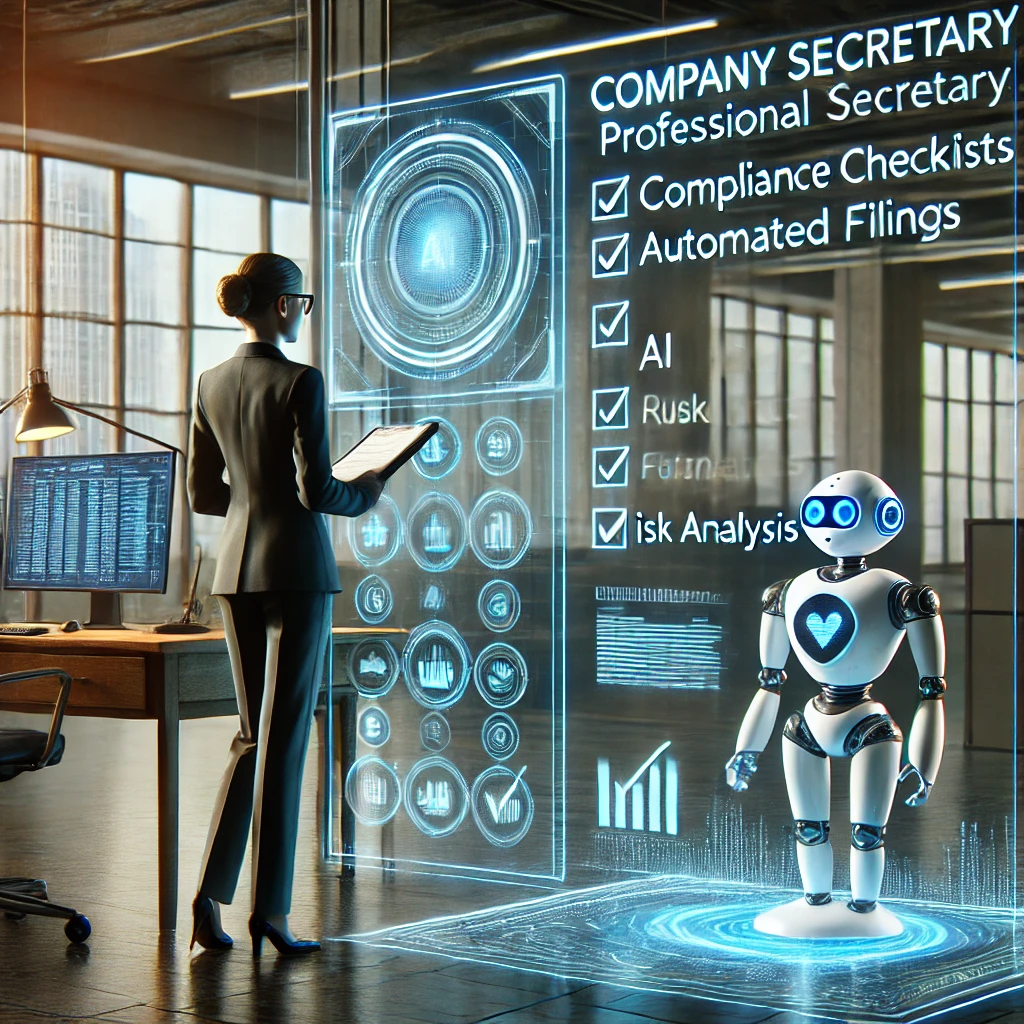How AI Will Impact the Role of Company Secretaries (CS)
Artificial Intelligence (AI) and automation are transforming industries worldwide, and the corporate compliance and governance sector is no exception. Company Secretaries (CS) play a crucial role in ensuring corporate governance, regulatory compliance, and strategic decision-making. With the rapid advancements in AI and automation, their role is evolving significantly.
Table of Contents

How AI Will Impact the Role of Company Secretaries
1. Automating Compliance & Regulatory Filings
One of the primary responsibilities of a company secretary is handling statutory filings and compliance requirements. AI-driven platforms can:
- Automate ROC filings and regulatory submissions.
- Ensure timely reminders for due dates and compliance deadlines.
- Reduce human errors in documentation and data entry.
💡 Example: AI-powered compliance management software can automatically track changes in corporate laws and update the company’s filings accordingly.
2. Enhanced Corporate Governance Monitoring
AI tools can help company secretaries monitor governance frameworks effectively by:
- Conducting real-time risk assessments.
- Identifying potential governance red flags using predictive analytics.
- Generating automated reports for board meetings.
💡 Example: AI can analyze historical compliance data to predict possible governance failures and suggest preventive measures.
3. Virtual Board Meetings & Digital Record-Keeping
With the rise of remote work, automation tools have made it easier to:
- Schedule and manage virtual board meetings.
- Auto-generate meeting minutes using AI-driven transcription tools.
- Maintain digital registers and records in a structured, easily accessible manner.
💡 Example: AI-powered meeting assistants can summarize board discussions and highlight key decisions.
4. AI Chatbots for Routine Compliance Queries
AI chatbots can assist company secretaries by:
- Answering routine compliance and regulatory questions.
- Guiding stakeholders on documentation and filing procedures.
- Providing instant access to legal and regulatory information.
💡 Example: A chatbot integrated into a corporate intranet can help employees with common compliance queries, reducing the CS team’s workload.
5. Fraud Detection & Risk Management
AI-driven risk management tools can:
- Detect anomalies in financial and governance reports.
- Identify fraudulent activities using AI-based pattern recognition.
- Provide early warnings on non-compliance risks.
💡 Example: AI algorithms can scan financial statements for inconsistencies, helping company secretaries ensure transparency.
6. Reducing Administrative Burden
Automation can take over repetitive and time-consuming tasks like:
- Document drafting and formatting.
- Sending compliance reminders and follow-ups.
- Managing digital signatures and approvals.
💡 Example: AI-powered document automation tools can draft board resolutions and agreements, reducing manual effort.
Challenges & Considerations
While AI and automation bring efficiency, company secretaries must also address challenges such as:
- Data Security Risks: Protecting sensitive corporate data from cyber threats.
- Regulatory Adaptation: Ensuring AI-driven compliance tools align with legal requirements.
- Workforce Adaptation: Upskilling to work alongside AI and use automated tools effectively.
The Future of Company Secretaries in the AI Era
AI and automation will not replace company secretaries but will enhance their strategic role by allowing them to focus on high-value tasks such as advisory, governance, and risk management. The key to thriving in this AI-driven landscape is continuous learning and adopting digital tools to improve efficiency.
🚀 Are You Ready for the AI-Driven Future?
Company Secretaries who embrace AI and automation will gain a competitive edge in corporate governance and compliance management. The future is about working smarter, not harder!
